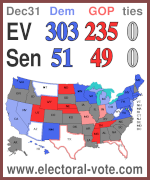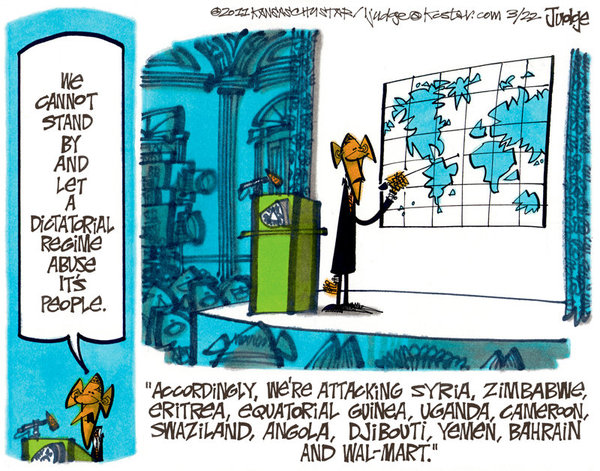Of course, we only attack countries that have oil.
-
‹ Home
Info
-
Subscribe
-
Users
Links
- All Hat No Cattle
- Andy Borowitz
- Axios
- Barry Deutsch
- Bearman Cartoons
- Beau of the Fifth Column
- Capitol Steps
- Cook Political Report
- Crooks and Liars
- Daily Kos Comics
- Daily Show
- David Horsey
- Derf City
- Digby
- Eclectablog
- Electoral Vote
- Fair and Unbalanced
- Fark Politics
- Five Thirty Eight Politics
- Funny or Die
- Funny Times
- Go Comics
- Hackwhackers
- Heather Cox Richardson
- HuffPost Comedy
- John Fugelsang
- Kung Foo Monkey
- Last Week Tonight
- Margaret and Helen
- Mark Fiore
- Matt Davies
- Matt Wuerker
- McClatchy Cartoons
- News of the Weird
- O'Carl's Law
- Politicususa
- PolitiFact
- Propaganda Professor
- Raging Pencils
- Randy Rainbow
- RCP Cartoons
- Saturday Night Live
- Slowpoke
- Stonekettle Station
- Ted Rall
- The Nib
- The Onion
- Tom the Dancing Bug
- Tom Toles
- USN Political Cartoons
- What Now Toons
-
Tags
Abortion Bush Campaign Finance Cheney Climate Clinton Congress Conservatives Corporations Corruption Deficits Democrats Drugs Economy Education Election Elections Energy Environment Fox News Gays Guns Health Immigration Lies McCain Media Middle East Obama Palin Protests Racism Religion Republicans Romney Spying Supreme Court Taxes Tea Party Terrorism Terrorists Torture Trump Unemployment War
-
Archives

You are Visitor #


9 Comments
You know the thought occurred to me that this congress seems alot like the last congress, and this president is starting to resemble the last one as well.
PatriotSGT: Oh, you noticed? 😉
(Seriously, I don’t understand why we’ve not made a cleaner break from old, failed policies. I have conspiracy theories about why *cough big money cough*, but no real knowledge.)
I think there is a significant distinction between how the W Administration manipulated events to start a war in Iraq, and how the Obama administration acted with an international coalition to implement a UN Security Council resolution. That said, the environment of a job and its history always put pressure on the current occupant and the presidency is particularly vulnerable to that pressure.
Whether you think the current Congress is the same as the last one is a matter of perspective – both appear insane, but with different flavors of insanity.
I don’t know what the right answer is, but that’s why I am supporting No Labels. It’s one organization that is trying to make a change in our political process without taking any ideological stands, and changing the process is what we need. If we keep doing what we’re doing we’ll keep getting what we’re getting, and we need to get something better than this.
The problem is Bush/Chaney were not impeached so the “tools” they took were passed on to future Presidents.
Afghanistan does not have oil,(that I know of) but there have been plans for a major pipeline since before the war.
Critical rhetoric has been flooding the airwaves since our strike on Libya, and it’s been taking two forms: anti-Obama and anti-intervention. The anti-Obama rhetoric is exactly what you would expect from the right; they’ll take any and every opportunity to criticize the president, even at the cost of appearing schizophrenic (think Newt Gingrich). None of this is surprising. Nor is the anti-intervention rhetoric coming from the left, and it is the latter that concerns me.
Afghanistan and Iraq seem to have left a sour taste in our collective mouth, encouraging an isolationist stance towards the world’s problems. In this particular case, I don’t think those who condemn our recent “ally enabling” fully appreciate the differences between past and present. Libya is not Afghanistan, nor is it Iraq. They also do not appreciate modern day differences. Clashes between protesters and police in other revolutionary countries, while saddening and unfortunate, pale in comparison to the wholesale slaughter that Qaddafi began against his own people with tanks and fighters. Our intervention in Libya is far more comparable to the U.N. peacekeeping mission in the former Yugoslavia – a joint effort to stop the massacre of innocent people – than our recent occupations of Afghanistan and Iraq.
Do I support the actions of the Obama administration? I haven’t decided; I don’t have enough information to take a definitive stance. But what I do know is that accusing the administration of unconstitutional warmongering and alluding to imperialistic motives (“Of course, we only attack countries that have oil.”) is not helpful to the conversation.
I hope people realize that (whether we set it up or not) the UN Security Council voted to impose the no-fly zone, and the US acitons were in support of that resolution. So quesitons of oil aside, there is a difference between acting in support of a UN resolution and just strating to shoot down planes and blow up tanks.
I support the actions of all the countries involved – Arab League, France, England, and the US – for NOT acting until a UN reoslution was pased and then acting swiftly. I think many people will say (and they may well be correct) that the US orchestrated the Security Council action. Others will say (less certain if they are correct) that we could have, or should have, done the same for some other countries. But that’s neither here nor there – there was some thought and due process here and that’s a positive sign.
And apologies for the typoes, my keyboard need to be replaced (and I need to use something with spell checking before posting EVERY time 🙂 )
ZJD, I should be clear that I support the intervention in Libya. I’m especially happy that it is being done under the auspices and approval of not just the UN, but the Arab League. Kudos to Obama for that.
I was just pointing out the irony of the fact that we do tend to attack places that have oil. After all, there are lots of places that are killing their own people that we aren’t doing anything about. I’m not even saying that is wrong — after all, our national interests are (far too) bound up with oil.
I understand where you’re coming from. In fact, I think all of us would be amazed at the extent to which oil geopolitics has influenced our foreign policy over the last century. It’s probably more than most of us have imagined, and that doesn’t seem to be changing. You are right to point out that we’re far more interested in a revolution in Libya than a revolution in, say, Bangladesh. And that I think, is an issue worth talking about.